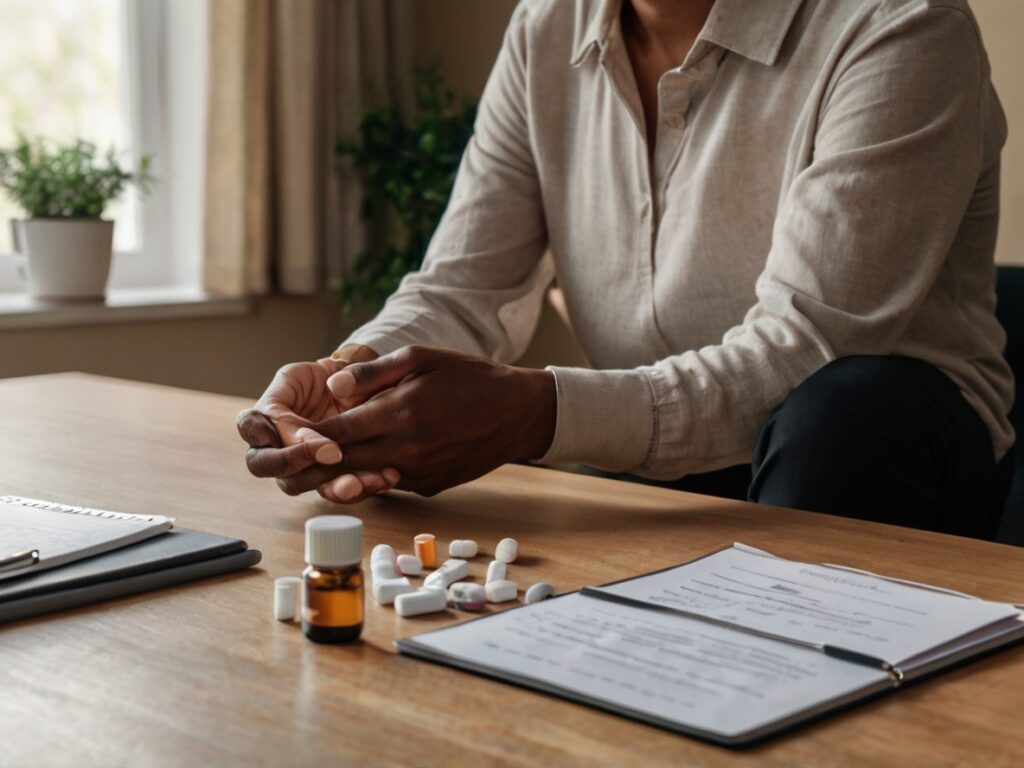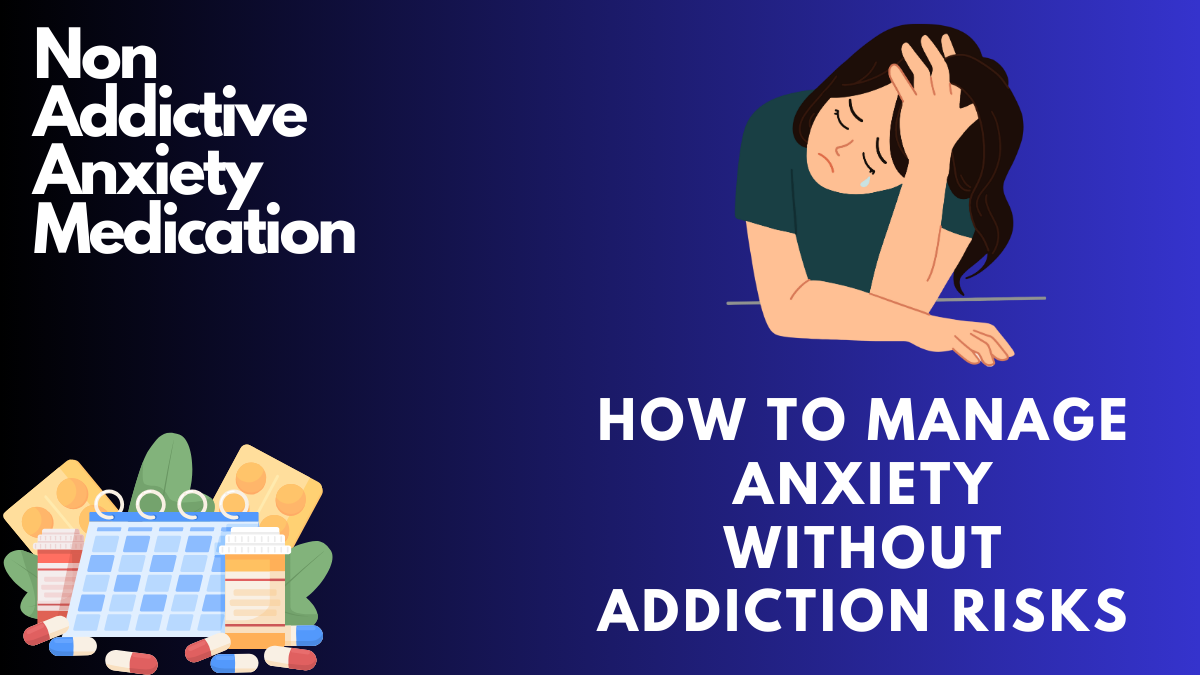Millions of people worldwide suffer from anxiety disorders, which can cause crippling feelings of worry, fear, and panic. Although benzodiazepines and other conventional anxiety drugs work well, there is a considerable danger of addiction and dependence. Fortunately, there are various non-addictive anxiety drugs available that offer significant relief without the risk of addiction. These choices will be examined in this piece, which will also include psychologists’ insights to offer a thorough manual for safely managing anxiety.

Table of Contents
Understanding Anxiety and Its Impact
Anxiety is a normal reaction to stress and can be helpful in some circumstances, like getting ready for an exam or remaining vigilant in hazardous conditions. But in people with anxiety disorders, this reaction is heightened and prolonged, causing great anguish and a major impairment in day-to-day functioning.In this article you must learn about non addictive anxiety medication.Excessive worry, restlessness, exhaustion, trouble focusing, anger, tense muscles, and disturbed sleep are typical signs of anxiety.
“Anxiety disorders are complex and multifaceted,” says Dr. Sarah Thompson, a certified psychologist with over 15 years of expertise treating anxiety disorders. It’s important to realize that although medicine can help control symptoms, it frequently works best when paired with lifestyle modifications and psychotherapy.”
The Risks of Traditional Anxiety Medications
Benzodiazepines are among the most often given drugs for anxiety, including Xanax and Valium. Although they work well in the short term, there is a significant chance of addiction and dependence. Tolerance to larger doses needed to have the same effect after prolonged use might result in severe withdrawal symptoms.In this article you learn about non addictive anxiety medication.
“Many patients are relieved to find something that helps their anxiety quickly at first, but the long-term consequences can be detrimental,” says Dr. Thompson. Investigating non-addictive anxiety drugs as safer substitutes is crucial.”
Non-Addictive Anxiety Medications: An Overview
Anxiety symptoms can be effectively managed with a variety of non-addictive anxiety medicines. Serotonin-norepinephrine reuptake inhibitors (SNRIs), beta-blockers, antihistamines, selective serotonin reuptake inhibitors (SSRIs), and several anticonvulsants are among them. We shall delve more into each of these choices below.
Selective Serotonin Reuptake Inhibitors (SSRIs)
One type of antidepressant that works well for treating anxiety problems is called SSRIs. They function by raising serotonin levels, a neurotransmitter important in mood regulation. For anxiety, common SSRI prescriptions include:
1. Sertraline (Zoloft)
2. Escitalopram (Lexapro)
3. Fluoxetine (Prozac)
4. Paroxetine (Paxil)
According to Dr. Thompson, SSRIs are frequently used as a first treatment for anxiety since they work well and are less likely to create addiction than benzodiazepines. But it could take a few weeks for them to start working, and some individuals might have adverse symptoms including nausea, sleeplessness, or erectile dysfunction.”
Serotonin-Norepinephrine Reuptake Inhibitors (SNRIs)
Another class of antidepressants that has been shown to be useful for anxiety is SNRIs. They function by raising norepinephrine and serotonin levels. SNRIs that are often prescribed for anxiety include:
1. Venlafaxine (Effexor)
2. Duloxetine (Cymbalta)
“SNRIs are non-addictive and may be a good choice for individuals with anxiety, just as SSRIs are. According to Dr. Thompson, they might also be helpful for comorbid illnesses like depression or chronic pain.
Beta-Blockers
Propranolol is one of the beta-blockers that is commonly used to treat high blood pressure, but it can also be useful in treating the physical signs of anxiety, like trembling and a fast heartbeat. When it comes to situational anxiety, like performance anxiety or public speaking anxiety, they are especially helpful.
“Beta-blockers can be a useful tool for individuals who experience acute episodes of anxiety, but they don’t establish habits. They are typically used in conjunction with other treatments because they do not address the psychological parts of anxiety that underlie it, suggests Dr. Thompson.
Antihistamines
You can also use some antihistamines, such as hydroxyzine, to treat anxiety. They produce a soothing effect by inhibiting the brain’s histamine receptors.
“Hydroxyzine is a non-addictive option that can be particularly helpful for patients who need immediate relief from anxiety symptoms. It can cause drowsiness, so it’s often used as a nighttime medication,” says Dr. Thompson.
Anticonvulsants
It has been discovered that certain anticonvulsants, including gabapentin and pregabalin, are useful in the treatment of anxiety disorders. They function by adjusting the brain’s neurotransmitter activity.
“For individuals who have not responded well to other non-addictive anxiety drugs, anticonvulsants may be a useful option. According to Dr. Thompson, they are usually well-tolerated and do not pose an addiction risk.
Non-Pharmacological Approaches to Anxiety Management
Although non-addictive anxiety drugs have their uses, non-pharmacological methods should also be taken into account. For anxiety disorders, cognitive-behavioral therapy (CBT) is one of the best therapies available. Through CBT, patients can recognize and confront harmful thought patterns and create more constructive coping mechanisms.
“While treatment tackles the underlying causes of anxiety, medication can help manage its symptoms. According to Dr. Thompson, cognitive behavioral therapy (CBT) is quite successful in improving anxiety symptoms over the long run.
Modifications to one’s lifestyle can be quite helpful in reducing anxiety in addition to therapy. Anxiety symptoms can be lessened by regular exercise, a balanced diet, enough sleep, and mindfulness exercises like yoga and meditation.
Self-care is essential for anxiety management. Dr. Thompson suggests making minor adjustments to everyday routines that can significantly affect anxiety levels and general well-being.
The Role of Natural Supplements
Vitamins and herbal medicines are examples of natural supplements that can help with anxiety management. Among the supplements that are most frequently utilized are:
1. L-theanine: an amino acid that is present in tea and helps people relax without getting sleepy.
2. Ashwagandha: a plant with adaptogenic properties that aids in stress management.
3. Valerian root: an herb well-known for its relaxing properties and capacity to enhance the quality of sleep.
4. Magnesium: a mineral that can help lessen the symptoms of anxiety and is important for the nervous system.
“While natural supplements can be helpful, it’s important to consult with a healthcare professional before starting any new supplement regimen, especially if you are taking other medications,” warns Dr. Thompson.
Conclusion
Using the appropriate strategy, anxiety can be managed without running the risk of addiction. SSRIs, SNRIs, beta-blockers, antihistamines, and anticonvulsants are examples of non-addictive anxiety drugs that effectively relieve anxiety symptoms. However, the best results from medication are frequently obtained in conjunction with lifestyle modifications, psychotherapy, and natural supplements.
Dr. Thompson stresses, “It’s critical that patients and their healthcare professionals collaborate closely to create a thorough treatment plan that targets anxiety’s underlying causes as well as its symptoms. Effective anxiety management is achievable without the risk of addiction with the appropriate set of treatments.”
In conclusion, non-addictive anxiety drugs offer a secure and reliable choice for anyone looking for anxiety alleviation. People can control their anxiety and enhance their quality of life by using natural supplements, medicine, therapy, and lifestyle modifications.
Frequently Ask Questions(FAQs)
What are non addictive anxiety medications?
The goal of non-addictive anxiety drugs is to relieve anxiety symptoms without increasing the chance of addiction or dependence. SSRIs, SNRIs, beta-blockers, antihistamines, and certain anticonvulsants are among these drugs.
How do SSRIs and SNRIs help with anxiety?
Neurotransmitters like norepinephrine and serotonin are increased in the brain by SNRIs (selective serotonin reuptake inhibitors) and SSRIs (serotonin-norepinephrine reuptake inhibitors), which help control mood and lessen anxiety.
Are beta-blockers safe for long-term use for anxiety?
When used as needed to treat situational anxiety, such as anxiety related to public speaking or performances, beta-blockers are usually safe. Since they don’t treat the psychological aspects of anxiety, they aren’t usually employed for long-term anxiety management.
Can antihistamines be used regularly for anxiety?
Anxiety can be controlled with some antihistamines, such as hydroxyzine, especially if relief is needed momentarily. They may, however, induce drowsiness; thus, a healthcare professional should supervise their frequent usage.
Are natural supplements effective for anxiety?
L-theanine, ashwagandha, valerian root, and magnesium are examples of natural supplements that may be useful in the treatment of anxiety. But since their efficacy varies, it’s crucial to speak with a doctor before beginning any new supplement regimen.
What is Cognitive-Behavioral Therapy (CBT) and how does it help with anxiety?
A form of psychotherapy called cognitive-behavioral therapy (CBT) assists patients in recognizing and disputing harmful thought processes as well as creating more constructive coping mechanisms. It is frequently used in conjunction with medication and is quite helpful in treating anxiety disorders.
How long does it take for non addictive anxiety medications to work?
It usually takes a few weeks for non-addictive anxiety drugs like SSRIs and SNRIs to start working. Patients should check their symptoms with their healthcare practitioner and have patience while taking their medication as directed.
Are there side effects associated with non addictive anxiety medications?
Indeed, side effects are possible with non-addictive anxiety drugs. SNRIs and SSRIs may result in sexual dysfunction, nausea, or insomnia. Beta-blockers may make you feel drowsy and exhausted. It’s critical to talk to a healthcare professional about any possible adverse effects.
Can lifestyle changes help manage anxiety?
Indeed, modifying one’s lifestyle to include regular exercise, a balanced diet, enough sleep, and mindfulness exercises like yoga and meditation can greatly lessen the symptoms of anxiety and enhance general wellbeing.
Should non addictive anxiety medications be combined with therapy?
Yes, the best results are frequently obtained when non-addictive anxiety drugs are used in conjunction with therapy, especially cognitive-behavioral therapy (CBT). While treatment tackles the underlying causes of anxiety, medication can help manage symptoms.

